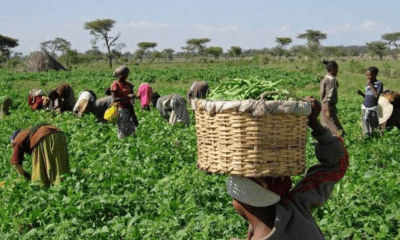News
Food security under attack in Benue: Government must act now

There is urgent need for immediate security measures to halt attacks on sedentary farmers in Benue State, Nigeria’s Food Basket State. This is because food security is under serious threat.
Investigation shows that after a period of relative peace, which dates back to March last year, the influx of cattle in Benue State and increasing wave of banditry, have placed the question of food security under threat, as local farmers are forced to be leaving their homes in droves because of fear of terrorists, some of who acts as herdsmen.
Only last week scores of locals were killed as a result of these activities. Though not independent verified by Nigerian NewsDirect, Peter Tion; Nyityo Kyoon; Iorfa Ukombor; Doopinen Awua; Tyoshaa Mkaanem; Asan Ate; Asough Ate; Terzungwe Asoo Ate; MWO Mbatsavbun Gbatar (rtd); John Ndahagh Tyohemba; Tertsea Ukombor; Akuma Kpenge; Abume Kpenge; Igba Byuan; Master Ter Byuan; Terzungwe Aulugh; Tsehemba Wandor; and “a little boy whose name is not yet known” were said to have been killed in Gwer East Local Government Area (LGA) alone, in one fell swoop. Gwer East is in Benue North West Senatorial District.
Elsewhere in Benue North East, Ayati Orlu-Bem Ayati, a rights lawyer said, “in Ukum Local Government Area of Benue State, when we wake up these days it’s the death tolls of the Fulani-slain farmers that we take stock of.
“From house to house, village to village, dead bodies pile up on the roads and in the bush – mangled dead bodies or burnt victims of Fulani onslaught with charred remains.”
No fewer than 29 persons were reportedly killed in the area alone, in the last one week. The news of the killings is not limited to the aforementioned local government areas. Kwande, Katsina-Ala, Logo, Gwer West are among LGAs that are still grappling with onslaught from
Ayati adds that “this is the sad reality of our new awareness in Benue State.”
These heinous killings are coming few and barely hours after an ultimatum by the Benue State Security Council on compliance with the state’s Open Grazing Prohibition and Ranches Establishment Law (2017), Laws of Benue State.
The Benue State Security Council, had on Tuesday, 20th February, 2024, issued a two weeks ultimatum to livestock owners, openly grazing in Benue State to comply with the State’s Open Grazing Prohibition and Establishment of Ranches Law, insisting that the law is still in force in the state.
Chief Press Secretary (CPS) to the Governor, Tersoo Kula, who briefed journalists after the meeting of the council, said a seven-man committee to ensure enforcement of the ultimatum has been constituted and signalled to commence work on Wednesday, 21st February, 2024.
On the same 20th February, the Senate of the National Assembly agreed with Senator Emmanuel Udende, Benue North East (APC) and Senate Committee Chairman on Anti-Corruption and Financial Crimes, that there is the need to take urgent security measures to halt activities of bandits in Benue North East.
Sen Udende, rising on the floor of the Senate urged the upper chamber of the National Assembly to adopt resolutions seeking to provide security for farmers in the country.
The Benue North East Senator cautioned that if measures were not taken immediately, there would be a severe food crisis in the country because bandits have taken over most parts of his Senatorial District, displacing farming populations. The senate, in its resolution, adopted the recommendations of the committee, with a view to constituting an implementation committee to ensure that the recommendations are implemented.
Of course, it is not news that hundreds of thousands of local farmers in Benue State are displaced due to activities of bandits and armed wing of cattle owners, with hundreds killed while property and fields worth billions destroyed.
The displaced are living in both Internally Displaced Persons (IDPs) camps and IDPs host communities, in dehumanising conditions, it is learned.
Nigeria NewsDirect further learned that the spirallying prices of agriculture produce in the state is traced to the activities of bandits and herdsmen because populations that otherwise should be engaged in food production have been displaced.
“Go to the farm for who? For cattle?” Udam Samuel from Gwer West rhetorically asked. There are cases of farmers that went to the farm and did not return. Others have stood watching their produce consumed by cattles.
In the face of these are terrorists, kidnapping, and robbing locals of their earnings from farms. In spite of joint military operations, the situation remains unchanged.
Last week, Chief Press Secretary to the Governor, Tersoo Kula, quoted the Ukum Local Government Council (LGC) as saying that the attack at Gbagir “was carried out by armed herders in collusion with a local Militia group, who attacked their rival gang over the killing of one of the herders, which resulted to casualties recorded and displacement of the locals from the area.”
It is a mixed story of local militia activities and the armed wing of cattle owners in Benue State, against local farmers.
Like the recent case of attacks on Gbagir, a community in Ukum LGA, Benue North East, anonymous sources say it’s due to activities of rival militia lords.
Sen Udende, earlier mentioned, in his motion called for review of the security architecture in the areas. In spite of the presence of security operatives, locals remain on the run, underscoring the call for the review of the situation.
Indeed, urgent measures need to be taken to avert the feminine that is staring Nigeria’s Food Basket State in the face. If the basket is empty, there is no food for the country. Starvation will set in.
News
Shettima departs for 2024 US-Africa Business Summit in Dallas


Vice-President Kashim Shettima is expected to depart Abuja for Dallas, United States of America, to represent President Bola Tinubu at the 2024 US-Africa Business Summit.
The summit is organised by the Corporate Council on Africa.
Mr Stanley Nkwocha, the Senior Special Assistant to the President on Media and Communications, Office of The Vice-President, said this in a statement on Sunday in Abuja.
Nkwocha said Shettima would join other political and business leaders across Africa, the USA and beyond for the summit.
According to him, the summit will feature high-level dialogues, networking business sessions and the plenary, all scheduled for the Kay Bailey Hutchison Convention Center in Dallas, Texas.
He said that the African leaders expected at the summit include, the President, Republic of Liberia; Joseph Boakai, President, Republic of Malawi; Lazarus Chakwera and the President, Republic of Angola, Joao Lourenço.
Nkwocha said other African leaders that would grace the summit are the President, Republic of Botswana, Mokgweetsi E. K. Masisi, President, Republic of Cabo Verde, José Maria Neves, and the Deputy Prime Minister, Kingdom of Lesotho, Nthomeng Majara.
He said besides the summit’s plenary, Shettima would speak at the Roundtable on African Infrastructure Investment with a focus on impact and returns.
” He (Shettima) is also scheduled to speak on a high-level panel on agribusiness, focusing on transiting “from food insecurity to thriving agribusinesses.
” Additionally, the Vice-President will speak at a plenary session on Navigating Africa’s Energy Future as well as chair a session dedicated to promoting the ‘invest in Nigeria’ initiative.
” He is also expected to attend other meetings and engagements on the sideline of the summit.”
Nkwocha said that Vice-President Shettima is expected back in the country at the end of his engagements in the US.
News
Israeli to close Al Jazeera’s operations in the country – PM Netanyahu


Prime Minister Benjamin Netanyahu said his Cabinet has unanimously voted to close broadcaster Al Jazeera’s operations in Israel.
The move came after Israeli lawmakers recently approved a new media law widely referred to as the “Al Jazeera law” that gives the government powers to ban foreign broadcasters if they are deemed a risk to state security.
Netanyahu announced the Cabinet decision in a post on X, formerly Twitter, in which he called Al Jazeera “the hate channel.”
Israeli Communications Minister Shlomo Karhi said on Sunday that he had signed the closure order and that it would be implemented immediately.
According to Israeli reports, this means that offices in Israel could be closed, broadcasting equipment confiscated, the station removed from cable and satellite television channels and its website blocked.
The Israeli government had accused Al Jazeera, which is based in the Gulf emirate of Qatar and has a wide reach in the Arab world, of biased reporting on the ongoing war against Hamas militants in the Gaza Strip.
Al Jazeera has reported extensively on the catastrophic situation in the Palestinian territory and shown images of death and destruction that are rarely seen on Israeli television stations.
The channel also regularly shows videos of attacks on Israeli soldiers by Hamas’ military arm, the Qassam Brigades.
The channel has rejected allegations of bias and, in the past, accused Netanyahu of spreading “new lies and inflammatory slanders” against the network.
Al Jazeera has also accused the Israeli military of deliberately targeting journalists on several occasions.
Netanyahu has accused Al Jazeera of “damaging Israel’s security, actively participating in the massacre on October 7 and inciting against Israeli soldiers.”
Al-Jazeera was founded in 1996 and is headquartered in Doha. It was one of the first Arab TV stations to publish critical reports on the region and quickly gained popularity.
The Israeli government’s efforts to ban Al Jazeera have drawn criticism from some of the country’s most prominent allies, including the United States and Germany.
The U.S. State Department expressed irritation of the decision and reiterated support for the free press all over the world.
A German Foreign Office spokesman also criticised the so-called Al Jazeera law last month: “A free and diverse press landscape is the cornerstone of a liberal democracy.”
News
OTC 2024: PETAN leads stakeholders on sustainable energy solutions for Africa’s future


The Petroleum Technology Association of Nigeria (PETAN) has led delegates to the 2024 Offshore Technology Conference (OTC) in Houston, Texas U.S. to discuss sustainable energy solutions for Africa’s future.
Mr Kevin Nwanze, Executive Secretary, PETAN, disclosed this in a statement on Sunday in Lagos.
Nwanze said that PETAN’s Nigerian pavilion at OTC 2024 would be hosted under the theme, “Sustainable Energy Solutions for Africa’s Future”.
He said that the conference would have more than 200 hours of multidisciplinary discussions and networking events, including a wide range of topics, suited for every participant.
PETAN scribe, however, called for stakeholders’ participation at the 2024 OTC, holding between May 6 and May 9 at the NRG Park, Houston, Texas, US.
According to him, PETAN has been responsible for hosting stakeholders at the OTC for many years.
“The association is calling on government agencies, stakeholders, oil and gas companies, and Nigerian investors to participate at the Nigerian pavilion at the prestigious event in Houston, U.S.
“Participation in the Nigerian pavilion shall deliver a unique opportunity for exhibitors and delegates to interact with global professionals
“As they share their insights on technological advances, energy transition, safety, environmentally focused solutions, and economic and regulatory impacts of the offshore energy sector,” he aded.
Nwanze said: “It allows organisations to engage with world leaders, CEOs, and government officials from around the world, with the chance to create and develop business relationships.
“And also tap into emerging regions vital to offshore development and obtaining recognition necessary for growth and visibility to thousands across the globe.
“Showcase your company’s capabilities to over 1,000 delegates and over 250 companies in the industry.
“Promote products and services to operators and contractors in the local region.
“Gain access to the latest industry news and access to networking opportunities with professional contacts from across the world.
“Network with the upstream, midstream, and downstream organisations and high-profile government officials and key decision-makers in the industry.
“Build and establish new leads as well as entrench a global presence in the industry.
“Get familiar with competitors’ capabilities to stay ahead in the industry,” the statement read.
The OTC 2024 expects over 31,000 energy professionals as attendees, 45 technical sessions, 450 presentations and over 1,300 exhibitors drawn from different countries, including Nigeria.
-
capital market2 years ago
Rt.briscoe, FBNH, Others halts negative performance of stock market
-
Finance3 months ago
Court orders Sen. Victor Umeh to repay N136m bank debt to AMCON
-



 Abuja Update2 months ago
Abuja Update2 months agoUNDP, FG partnership needed to achieve inclusion, equity- Minister
-
Abuja Update1 month ago
Banks drive stock market performance with N147bn gain
-



 Business2 weeks ago
Business2 weeks agoTingo Group unveils Tingo Electric, Tingo Cola drink at Lagos launch
-



 Health3 weeks ago
Health3 weeks agoCapacity training will reduce migration of health workers- NPHCDA
-
News4 months ago
Oil thieves sponsoring malicious media campaign against Navy – Spokesman
-



 Infotech1 month ago
Infotech1 month agoWorld Backup Day: NITDA urges Nigerians to ensure backup of data














